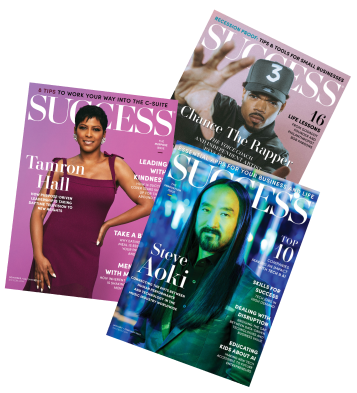As I neared the end of writing my first book, Find Your Courage, I decided it was time to see whether I could find a publisher. I did a little research online and discovered I first needed a literary agent. So I put together a query letter, which I sent to a long list of agents who all turned me down. Bah humbug, I thought. I’ll go direct! So I started sending off letters directly to publishers. More rejections followed. I was a no-name, no-fame self-help writer. If only I had a Kardashian surname.
Eventually, I decided to change tack and self-publish, selling my book via my speaking engagements and newsletter database. After selling a few thousand copies, I resubmitted the hard copy book to all the publishers again. In the months that followed, more rejections came in. It was disheartening. I believed I’d written a practical and inspiring book that would be helpful to a lot of people who feel stuck in their lives, and yet no publisher was willing to back it.
But as discouraging as it was, I kept plugging along, doing more and larger speaking engagements and writing my regular newsletter. It wasn’t easy, but I hung in there and I’m so glad I did. Because one day, about six months into my rejection marathon, I opened my inbox to find an email from McGraw-Hill, a major New York publisher, wanting to buy the international rights for Find Your Courage. I will never forget how thrilled I felt at that moment. “We think this is an outstanding book,” they said. Woo hoo! My work was going global!
But not without my fair share of rejection along the way.
Of course, most of us barely got through kindergarten without experiencing rejection. But whether you were the only child in your fifth-grade class not invited to the birthday party of the year, or you were passed over for a promotion, or you had the love of your life tell you that you weren’t theirs, you’ve no doubt felt the sting of rejection.
There’s no doubt about it, rejection can be very painful and feel intensely personal. But although it’s hard not to feel its sting, it’s vital not to let your fear of it keep you from risking it.
1. Rejection is not about you; what you make it mean is.
You can have the ripest and most delicious strawberry ever grown, but there will still be someone who hates strawberries. The value of my book didn’t change after it was picked up by a major publisher. What changed was that a person in that company recognized its value. The truth is, a rejection says far more about the person rejecting—their values, perceptions, priorities and indeed their biases, insecurities and fears—than it does about the person who has been rejected.
For example:
- Maybe they weren’t up for the relationship or commitment.
- Maybe they thought you were overqualified and would quickly get bored.
- Maybe the timing was off.
- Maybe they were having an off day. Maybe you were.
The person doing the rejection made their decision based on their subjective assessment—one shaped by their concerns, values, assumptions, opinions and unconscious biases. The rejection means no more or less than that. The rest is pure conjecture.
The part of rejection that relates to you is about the spin you put on it; that is, the story you tell yourself about why you were rejected and the subsequent actions you take. If you interpret a rejection as proof that you are unemployable or unlovable or doomed to never achieve what you want, you’ll find it tough to do whatever is needed to achieve the result you want. Rather than chastise yourself or wallow in self-pity, make the most of the opportunity to learn and grow, and set yourself up for more success in the future. As author Sylvia Plath once wrote, “I love my rejection slips. They show me I try.”
2. Don’t waste your rejections; learn and grow from them.
Talk to any truly successful person and they’ll tell you they had to risk rejection to get where they are. Again and again and again. They’ll also tell you that the rejections provided invaluable opportunities to gain useful feedback, polish their offer and fine-tune how they presented it and themselves. If you didn’t get the second interview, find out what they wanted in their ideal candidate. If you were passed over for that promotion, ask what you need to strengthen to get it next time. Opportunities go to those who stay proactive, even when they aren’t getting the results they want. The more often you’re willing to put yourself on the line, the sooner you’ll get over it.
3. The more you put yourself out there, the sooner you’ll land what you want.
Find Your Courage is now in six languages. You might think I’ve struck it lucky. But it’s not luck; it’s arithmetic (plus hard work and courage!). The more you put yourself out there, the greater the odds you’ll get “lucky”—creating amazing opportunities, building great relationships and achieving what truly excites you.
As my dad always says, “You’ve got to be in it to win it.” By refusing to get sucked into negative comparisons, self-rebuke and self-pity, you can rise above your rejections and do the very things you need to do to bump yourself up to the top of someone’s yes list.
4. Rejection never hurts as long as regret.
For all the rejection I’ve experienced, I still don’t like it. While writing my fourth book, I’ve had to risk rejection all over again. Rejection from publishers. Rejection from those I ask to review it. Rejection from people I hope will buy it (like you). I write anyway because although I dislike rejection, far worse is the idea of one day looking back and wondering, What if?
Ironically enough, while I was working on this article, I received an email saying Bear Grylls has endorsed my book. Pretty cool? Absolutely. Lucky? Of course not.
Too often we spend our lives avoiding any possibility of rejection. Our fear of being judged as unworthy (or a lousy writer) keeps us from putting ourselves out there. But just imagine the possibilities that could open up if you were willing to risk rejection and embrace the belief that doing so was crucial to achieving what you truly wanted in your work, relationships and life.
So stop making rejection mean anything about how worthy you are or the value you bring. Dare to risk being rejected more often—not to injure your pride, but to expand your possibilities. Isn’t that worth the occasional sting? To quote Bear Grylls: “If you risk nothing, you gain nothing.”
This article was published in January 2017 and has been updated. Photo by Rushay/Twenty20



